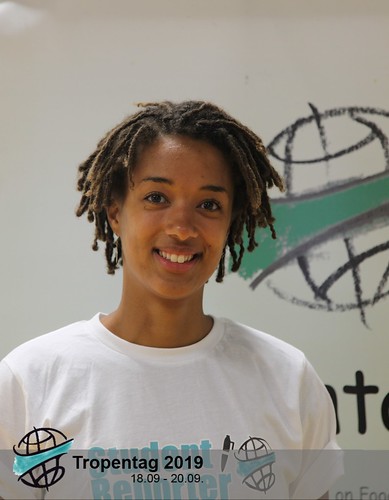Student Reporters 2019
German-Tanzanian Simba
Mon, 09/16/2019 - 19:20 — Bauer
Being passionate about sustainabilty and mindfulness, Rebecca came to Tropentag eager to find out more about research and projects around the world, seeking to accomplish the SDGs.
She came to Kassel straight after her Bachelor defence in Hohenheim, which explored the growth of tropical grasses through monitoring the leaf elongation of rice, maize, and panicum. This is also when things fell into place: after the defence, her professor asked her to replace a reporter that had left. Now she is part of the student reporter team- what an amazing coincidence!
Not only does she follow her passion for sustainability in her academic career but she also puts it into action as an active member of Greening Hohenheim, a student group rising awareness about mindfulness and sustainability at the university of Hohenheim.
Apart from saving the world, her dream is to build an earthship in Tanzania. As a first step after Tropentage2019, she is going to leave for an internship at the International Water Management Institute (IWMI) in Sri Lanka.
Interview with the student reporter Amina Ahmed
Mon, 09/16/2019 - 19:18 — Lesser
Why are you a student reporter at the Tropentag this year?
As a scientist, I believe I can effectively communicate results obtained from research and experiments with colleagues and professors from the same field, but I find it hard to vehiculate these pieces of information with people from other fields. Some of the participants or enthusiasts of Tropentag are not scientists or natural scientists - and reporters work as tools to give a chance to the outer public to understand what is going on during the conference and to connect people that share the same interests.
How did you come here?
Checking the website from the University I attend - University of Goettingen - I read the news that Tropentag was looking for student reporters. Fortunately I applied and was accepted into the team.
What are your expectations?
De J Vu
Mon, 09/16/2019 - 19:03 — WilmsJess was a Canadian masters student at the University of Hohenheim, and has completed her master's degree in agriculture in the tropics and subtropics. Currently, she lives in Stuttgart far from her home, Ontario, Canada where she fell in love with the "warm" weather.
Her interest in agriculture started really early, with her growing up on a farm in Lindsay, Ontario. And after completing her bachelor’s degree in environmental science, paired with a passion for helping others and interest in rural development, she knew what she wanted to do: sustainable tropical agriculture. She is currently searching for opportunities post-MSc and is super excited for the future.
This year Jess is both the editor of the Tropentag 2019 team and the team captain. This last comes naturally for her, since she already has experience from her last year, and is looking forward to collaborating with a new, diverse and fun group of people to promote Tropentag to the world.

The secret for producing meat is microscopic
Mon, 09/16/2019 - 18:47 — Martinelli
Animal production has been pointed out as the great villain for the environment. If on one hand, reducing meat consumption would decrease GHG emissions, on the other hand changing food habits and dealing with lack of protein are still a challenge.
In the climate change and food insecurity context, finding a way to produce sustainable meat seems to be a better transitional option. The increasing demand, especially from the European market, proves that this can be a way for the future. That is why Sam, as an animal science researcher, is looking for more natural and sustainable ways to produce protein, more specifically from chicken.
If an animal is treated with antibiotics for a prolonged time period, it will get create antibiotic resistance and the required doses of antibiotic will be higher every time. However, if they are treated with "good microbes" (probiotics) the use of antibiotics will decrease, and the products will be a more natural and healthy protein to consume.
And how has he discovered this?




